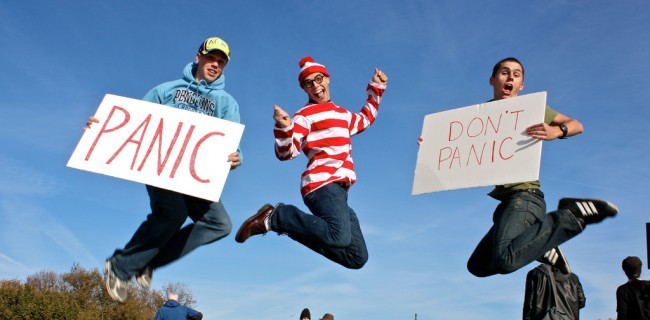 Your paruresis comes with several side effects, one of which may be the infamous panic attack. These moments of pure terror typically make your heart race, your palms sweat and your head feel like it’s going to explode. While panic attacks are not pretty, you can make them a bit less ugly with a few helpful hints on what to do – and not to do – when you feel one approaching.
Your paruresis comes with several side effects, one of which may be the infamous panic attack. These moments of pure terror typically make your heart race, your palms sweat and your head feel like it’s going to explode. While panic attacks are not pretty, you can make them a bit less ugly with a few helpful hints on what to do – and not to do – when you feel one approaching.
Tips for Immediate Relief
Accept what’s happening. The more you try to fight a panic attack, the deeper it will seize you in its grip. Think of it like a pair of Chinese handcuffs, or that woven tube into which you insert one finger from each hand. The harder you pull to escape, the tighter the finger-cuffs grasp you. Try to accept attack as well as the fact that you’re feeling anxious about whatever it is may have spurned the attack.
Don’t forget to breathe! Panic attacks can send you into a hyperventilated frenzy – or you may forget to breathe altogether and end up gasping for air. Make your breath slow and steady, starting with a slow, shallow inhale through your nose and slow exhale out of your mouth. Try counting to two with each inhalation and exhalation to create a steady rhythm.
Give yourself “permission.” You’re anxious. You’re suffering from acute panic. And guess what? You’re allowed to. Let it be OK that you’re feeling anxiety and that your body is reacting as bodies tend to do when their owners are experiencing extreme anxiety.
Distract yourself. Get busy on something, anything, that can help release all that tension. Write a poem. Throw a ball. Punch a pillow. Run around the block.
Talk to yourself. Before you scoff, hear this one out. And be aware you can talk to yourself silently, in writing or out loud, the latter probably preferable if you happen to be alone. Your self-dialogue can take two different forms:
Naming your feelings. This practice, borrowed by Tiny Buddha writer James Gummer from Tara Brach, involves naming your thoughts and feelings as they surface during your time of duress.
Fear. Anger. Anxiety. I am thinking how much I hate this. I feel like screaming or running around the block. My neck is all tight, my fists are all clenched and I’m forgetting to breathe!
Using positive reinforcement. One of the most positive things you can remember is that adage that many of us have come to hate:
This, too, shall pass.
Other positive self-talk can include things like:
Here we go again with this anxiety stuff. Last time I forgot to breathe, but this time I have tools to use to get through it. It’s OK to feel this way. A panic attack is not the end of the world. I see no immediate danger coming at me. It’s not like my head is going to cave in or explode. I just need to wait this out because, of course, this too shall pass.
Take a walk. This suggestion from Gummer incorporates several of the remedies into a single activity. Walking gets you moving and distracted. Your movement makes your blood flow and your lungs kick in, helping to establish a steady, even breathing rhythm. And it also helps to release that pent-up anxiety that is contributing to the panic attack. Swing your arms. Sing a song. Scream in a side street if you can get away with it.
“Move a muscle, change a thought,” as another adage suggests.
Ongoing Lifestyle Tips
While lifestyle changes may not help you at the very moment you feel an attack coming on, they may certainly help prevent attacks from rearing up in the first place.
- Eat: A host of nutritional information is in our Feeding Yourself Calm series, and one of the most important tips is keeping your blood sugar level stable. Avoiding excessive is another good tip, as is limiting caffeine and alcohol, both of which can wreak havoc on panic.
- Sleep: Drowsy and cranky easily mean panicky. Adequate sleep, which clocks in at between six and eight hours each night, is a great anxiety alleviator that additionally benefits your physical and mental health. Check out our post Sleep, Your Anxiety, and How to Make it Better By Tonight for more info.
- Exercise: Exercise benefits both your body and mind, with the power to make you slimmer, calmer and even happier, Mayo Clinic notes. It also serves to help deter panic attacks and anxiety issues, including your paruresis. Check out more info in our Anxiety and Exercise post.
Worst Things to do for a Panic Attack
Don’t Take a Deep Breath
While it’s probably become clear by now that you want to remember to breathe, one of the worst things you can do is kick off that breathing with the long-recommended “Take a deep breath.”
A shallow breath is more panic-friendly, according to Southern Methodist University’s Alicia Meuret. She led a study that found people who are hyperventilating in the throngs of panic are expelling high amounts of carbon dioxide, Science Daily reports. Deep breathing makes the situation worse, but slow and steady shallow breathing can be a helpful remedy.
Don’t Listen to Useless Banter
When you experience a panic attack around others, they may mean well and try to be helpful. But their so-called help can actually do more harm than good. That’s because they may say things like:
Take a deep breath
A few other well-meaning yet useless chunks of advice come from Thought Catalog writer Gaby Dunn’s article on what not to say to someone suffering a panic attack.
- Just calm down. As Dunn notes, you’ve probably already tried that one and, evidently, it did not work.
- C’mon, there’s nothing to be panicky about. In reality, perhaps not. In your mind, heck yes! And your mind already sent signals to your brain that it’s time for your body to react in panic.
- Stop overreacting. Panic attacks can be pretty scary, so no reaction is an overreaction if you’re experiencing pure terror. This one also falls into the “no kidding” category of advice due to the fact that if you could stop any aspect of the panic attack you most certainly would – and now you have some tools to do so.
SOURCES:
- http://www.projecteve.com/understanding-panicanxiety-disorders-and-coping-skills/
- http://tinybuddha.com/blog/3-things-panic-attacks-dont-want-you-to-know/
- http://www.mayoclinic.com/health/panic-attacks/DS00338/DSECTION
- http://thoughtcatalog.com/2012/4-things-you-shouldnt-say-to-someone-having-a-panic-attack/
- http://www.livescience.com/9204-stave-panic-deep-breath.html
Photo Credit: thekellyscope via Compfight cc




